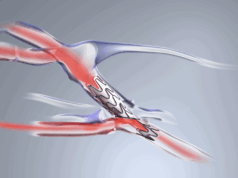 Vascular Therapies has today announced completion of enrolment in the ACCESS 2 trial, a Phase III prospective randomised, multicentre clinical study of Sirogen for the surgical creation of arteriovenous (AV) fistula in patients requiring haemodialysis vascular access.
Vascular Therapies has today announced completion of enrolment in the ACCESS 2 trial, a Phase III prospective randomised, multicentre clinical study of Sirogen for the surgical creation of arteriovenous (AV) fistula in patients requiring haemodialysis vascular access.
Vascular Therapies developed its sirolimus formulation (Sirogen) for intraoperative local, perivascular drug delivery. In a post-hoc subgroup analysis from ACCESS, the original US prospective randomised study, Sirogen showed improved fistula maturation and secondary patency when compared to standard of care controls.
The ACCESS 2 Study was designed to validate the post-hoc results from ACCESS and further evaluate the effectiveness of Sirogen to improve outcomes in patients requiring an AV fistula. This multicentre randomised study enrolled 136 patients across 17 centres in the USA and the UK. The primary endpoint of the study is fistula maturation at six months, and results are currently expected to be announced in the second quarter of 2025.
John McDermott, chief executive officer (CEO) of Vascular Therapies said: “We are very pleased to complete enrolment in this important clinical study. A functional vascular access is the lifeline for dialysis patients and although AV fistula remains the preferred vascular access for most haemodialysis patients, there is still an unacceptably high rate of failure necessitating reinterventions, increasing patient morbidity and healthcare costs. We are confident that Sirogen has the potential to provide patients with kidney disease a new therapy to improve vascular access outcomes.”
Sriram Iyer, chief scientific officer of Vascular Therapies added: “The encouraging outcomes from the original ACCESS study provide a strong signal that Sirogen has the potential to bridge an important unmet clinical need and we are optimistic that the ACCESS 2 outcomes will be confirmatory. We would like to thank the patients, physicians and research personnel and are very grateful for their cooperation and participation in this study.”













